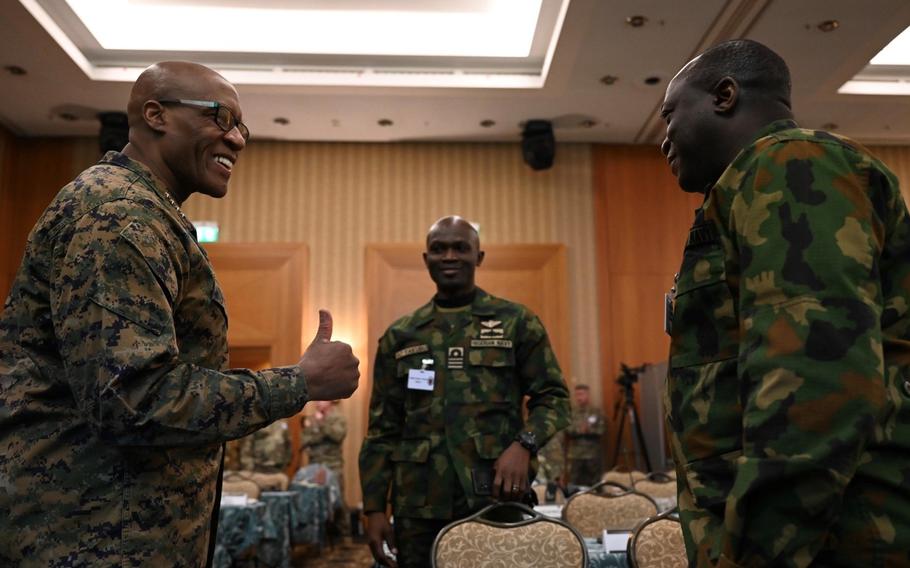
U.S. Africa Command’s Gen. Michael Langley meets with members of the Nigerian navy Dec. 4, 2023, during Silent Warrior 23, a security conference hosted by U.S. Special Operations Command Africa. The gathering in Garmisch-Partenkirchen, Germany, brings together military officials from dozens of countries. (Tyler McQuiston/U.S. Air Force)
GARMISCH-PARTENKIRCHEN, Germany — Before Botswanan special forces regiment commander Lt. Col. Lolo Bokwe deployed to Mozambique two years ago to root out Islamic State group fighters, his troops got a crash course from the U.S. military.
“We asked them to tailor-make (the training) to mimic what we’re going to do in Mozambique,” said Bokwe, who is in this Bavarian resort town this week for a conference called Silent Warrior 23.
His regiment was part of a multinational force sent to fight ISIS. The American lessons in countering roadside bombs and booby traps, and working with the local populace, proved decisive in ejecting the terrorist group’s militants from most of their strongholds in Mozambique’s Cabo Delgado region.
During his visit to Germany, Bokwe will share his experiences with other special operators from militaries across Africa. The Stuttgart-based U.S. Special Operations Command Africa is hosting the conference.
Silent Warrior 23, which kicked off Monday, involves military officials from more than 20 African countries and over a dozen other nations with interests on the continent.
The weeklong gathering in Garmisch-Partenkirchen is centered on finding ways to expand multinational cooperation in countering the various terrorist groups entrenched in Africa, officials said.
The reason is that crises tend to ripple beyond national boundaries, said SOCAFRICA’s Maj. Charlie Flood, the event organizer.
At the top of the agenda were deep dives into the major extremist threats in Africa: al-Shabab in Somalia, affiliates of ISIS and al-Qaida in the Sahel, and ISIS in Mozambique.
“Our mission is to deter and defeat transnational threats, and we do this in a myriad of ways, but mostly through partnerships,” SOCAFRICA commander Rear Adm. Ronald Foy said Monday.
U.S. Africa Command’s Gen. Michael Langley opened the conference by saying he was there to learn what respective militaries found to be most effective.
“Allies and partners are the center of gravity to success in any operation,” Langley said.
The U.S. military’s role in Africa is multifaceted and often behind the scenes. For special operators, the top mission is the ongoing effort to advise Somali forces in their battle against al-Shabab.
Meanwhile, terrorist networks in western Africa have been expanding in the volatile Sahel region, where political upheaval is creating problems for U.S. operations in the region.
In July, a coup in Niger upended the military’s relationship with the country, which served as the main hub for American forces in western Africa.
Since then, the U.S. Air Force’s drone base in Agadez has stopped executing counterterrorism missions. Other training, including that carried out by U.S. special operations troops in the country, also has been halted.
Langley didn’t directly address the situation in Niger or other coups elsewhere in Africa. But he alluded to it when he highlighted the need for militaries to operate in line with their civilian leaders.
“Good governance is a key to countering violent extremist organizations,” Langley said. “Yes, we’ve had some challenges across the continent. ... We know that civilian government, they’re the boss. We (the military) execute the missions.”
Bokwe said Botswana is fortunate to have been spared the political turmoil seen in other African countries. The relative domestic stability means Botswanan troops can deploy outside the country, such as for the mission to battle ISIS in Mozambique.
When his troops arrived in 2021, ISIS controlled all 15 districts in the Cabo Delgado region. That is down to just one district today, he said.
Botswana was interested in helping because the threat was on his country’s doorstep, Bokwe said, adding that there was goodwill with the residents when his tour recently ended.
“People were even telling us not to go,” he said.
A residual multinational force was left behind amid concerns of a potential ISIS resurgence, he said.